Gunma, Woven textiles and more
- Sort by
- Popularity
- Name
-
Edo Oshi-e Pictures on Embossed Fabric Edo oshie
- Dolls, kokeshi
- Tokyo

Edo Oshi-e, or Edo Oshi-e Embossed Fabric Pictures, are a traditional craft produced around Nihombashi and Asakusa, Tokyo from the late Edo period (1603 - 1867). Today, they are also produced in Sumida ward, Koto ward, Katsushika ward in Tokyo, as…
View more
-
Edo-sekku doll Edo sekku ningyo
- Dolls, kokeshi
- Tokyo
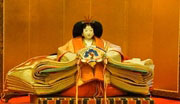
Edo Sekku Ningyo are dolls produced in 12 of the wards in Tokyo and four cities in Saitama Prefecture. They are costumed dolls, such as ichimatsu ningyo (play dolls), gosho ningyo (palace dolls) and fuzoku ningyo (dolls in period costumes), as wel…
View more
-
Hachio island silk Honba kihachijo
- Woven textiles
- Tokyo
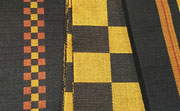
Honba Island Silk (called Honba Kihachijo in Japanese) is produced on Hachijojima Island in Tokyo. The name of this craft derives from a silk fabric with stripe and check patterns mainly dyed in bright yellow called kihachi. Patterns mainly dyed i…
View more
-
Hakata brocade Hakata ori
- Woven textiles
- Fukuoka
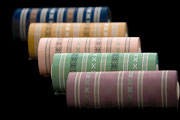
Hakata ori refers to the ori or woven cloth produced in and around Hakata, Fukuoka prefecture. Hakata weaving techniques, which originated in China, have shaped this unique cloth. It has been highly regarded for its high quality throughout the age…
View more
-
Hakata doll Hakata ningyo
- Dolls, kokeshi
- Fukuoka
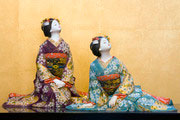
Hakata dolls (called Hakata ningyo in Japanese) are unglazed clay dolls produced in the city of Hakata, in Fukuoka prefecture. The notable features of Hakata dolls are their subtle soft colors, delicately carved expressions, and curves that almost…
View more
-
Iiyama Buddhist altar Iiyama butsudan
- Household Buddhist altars
- Nagano
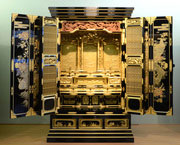
Iiyama Buddhist Altars, called Iiyama Butsudan in Japanese, are made around the city of Iiyama, Nagano prefecture. Iiyama is known for its people being devout to Buddhism since ancient times, which sustains the tradition of altar production. This …
View more
-
Isesaki traditional resist-dyed textiles Isesaki kasuri
- Woven textiles
- Gunma
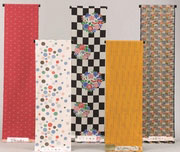
Isesaki Kasuri is a type of woven fabric produced in Isesaki, Gunma prefecture. Mainly used for kimono, this fabric has been admired for its texture since ancient times. Today, neckties and shop curtains called noren in Japanese are also produced.…
View more
-
Kiryu brocade Kiryu ori
- Woven textiles
- Gunma
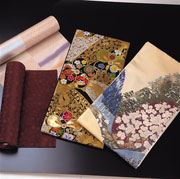
Kiryu brocade (called Kiryu ori in Japanese) is a woven cloth produced in the city of Kiryu, Gunma prefecture. This area has a lush environment with excellent climate and terrain, helping it to be prosperous in the silk industry for years. Kiryu i…
View more
-
Kurume traditional resist-dyed textiles Kurume gasuri
- Woven textiles
- Fukuoka

Kurume traditional resist-dyed textiles (Kurume gasuri in Japanese) is a woven cloth produced in and around the city of Kurume, Fukuoka prefecture. The breathability assures coolness in the summer and excellent heat-retaining properties provide wa…
View more
-
Murayama-oshima tsumugi silk Murayama oshima tsumugi
- Woven textiles
- Tokyo
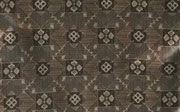
Murayama oshima tsumugi is a silk textile produced in the region surrounding Musashi murayama in western Tokyo. This craft is produced from hand-spun threads pulled from dupioni silk and has kasuri patterns* woven with both warp and weft patterns.…
View more
-
Naniwa Honzome Hand Dyeing Naniwa honzome
- Dyed textiles
- Osaka
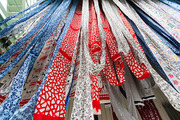
Naniwa Honzome Hand Dyeing is a traditional Japanese dyeing method, of which products are mainly produced in Sakai and Kashiwara, Osaka Prefecture. Osaka was a large producing center of Japanese hand towels called tenugui since the Edo period (160…
View more
-
Osaka Buddhist altar Osaka butsudan
- Household Buddhist altars
- Osaka
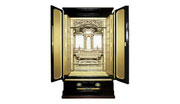
Osaka Buddhist altars (called Osaka butsudan in Japanese) are produced in the cities of Osaka, Yao, Higashiosaka, Sakai, and Kishiwada in Osaka prefecture. Along with the standard lacquer-painted, gold-leafed altars, this region is also known for …
View more
-
Shinshu tsumugi silk Shinshu tsumugi
- Woven textiles
- Nagano
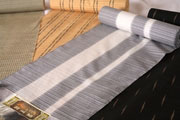
Shinshu tsumugi is a type of silk fabric also known as pongee and produced throughout Nagano prefecture. Each region in the prefecture has their own production styles and techniques. Also, the specific name of this fabric differs depending on the …
View more
-
Suruga doll accessories Suruga hinagu
- Dolls, kokeshi
- Shizuoka
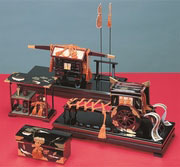
Suruga Hinagu (Hina Doll accessories) are a traditional craft produced mainly in Shizuoka city, Kakegawa city and Yaizu city in Shizuoka prefecture. A distinctive feature of Suruga Hinagu is that every piece of furniture, such as chests of drawers…
View more
-
Suruga-hina doll Suruga hina ningyo
- Dolls, kokeshi
- Shizuoka
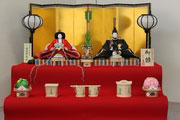
Suruga Hina Dolls are dolls made in and around Shizuoka City in Shizuoka. Suruga Hina Dolls are larger than other dolls as thick rice straw is used to form the body which is the center of the doll. It is said that rice straw was used because Shizu…
View more
-
Tama brocade Tama ori
- Woven textiles
- Tokyo
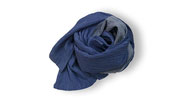
Tama brocade (called Tama ori in Japanese) is a woven silk fabric produced around Hachioji, Tokyo. Since ancient times, Tama ori has been well-known under the name of Hachioji woven fabric. The following five different types of woven fabric are …
View more
-
Tokyo Honzome Chusen Tokyo Honzome Chusen
- Dyed textiles
- Tokyo
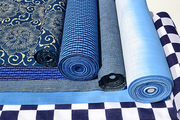
Chusen is a dyeing technique to pour dye onto the fabric. By pouring dye onto layers of fabric from the top and bottom, both sides of the fabric are dyed beautifully so that there is no difference between the back side and front side. Fabrics dyed…
View more
-
Tokyo Plain Dyeing Tokyo mujizome
- Dyed textiles
- Tokyo
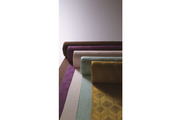
Tokyo Plain Dyeing, called Tokyo Mujizome in Japanese, is a plain dyed textile that started in the mid-Edo period by dyeing artisans as plain dyeing of Edo Murasaki(Edo Purple), indigo, safflower and Edo Cha(Edo Brown). The current main productio…
View more
-
Tokyo fine-patterned dyeing Tokyo some komon
- Dyed textiles
- Tokyo
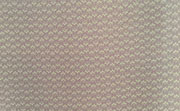
Tokyo fine-patterned dyeing (called Tokyo some komon in Japanese) is a stencil dyed textile produced in different wards of Tokyo like Shinjuku and Setagaya. It was designated as a traditional national craft in 1976. This textile can seem plain fro…
View more
-
Tokyo textiles Tokyo tegaki yuzen
- Dyed textiles
- Tokyo

Tokyo Tegaki Yuzen are kimono textiles produced in Shinjuku Ward, Nerima Ward and Nakano Ward, Tokyo. Having been produced in the townsmen culture of Edo (current Tokyo), a refined stylishness is expressed in its soft, subdued colors. Unlike other…
View more
-
Yame-fukushima Buddhist altar Yame fukushima butsudan
- Household Buddhist altars
- Fukuoka
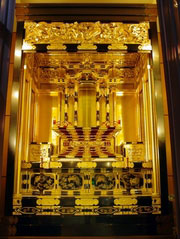
Yame Fukushima Butsudan are Buddhist altars made in Yame City (former Fukushima Town), Fukushima Prefecture. Dotted with many temples, the Yame region had been a place where there were many devout Buddhists since ancient times, which supported the…
View more
- 1































































































































































































































































































